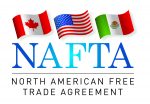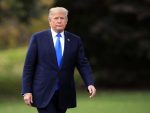Dr. Pinar Cebi Wilber
Lighthizer Should Take a Longer-Term View
U.S. Trade Representative Robert Lighthizer’s all-or-nothing approach to overseas investment is very shortsighted (“Nafta Proposal Jolts Energy Sector,” U.S. News, April 25). A U.S....
EU leaders put Trump’s unilateralism to the test
The White House is having a busy week with visits by French President Emmanuel Macron and German Chancellor Angela Merkel. The list of issues...
U.S. trade relations
President Trump made his mark as a businessman prior to occupying the Oval Office and he often gives his sales pitch for America: The country is...
Op-Ed: Low-income Americans the biggest losers from Trump’s tariffs
President Trump announced his final decision on steel and aluminum tariffs. While it looks like we will have to wait for details on which countries and products will be covered, the president repeated his emphasis on fairness and that we might see further action on trade. However, the whole process has been alarming to American businesses and our major allies.
Look beyond the threat of steel tariffs to the 1.8 million jobs that could...
The seventh round of Nafta talks are under the shadow of President Trump’s plan to impose a 25% tariff on imported steel and a...
How to Shape U.S. Infrastructure Policy
This special report first looks at the reasons for infrastructure investment and then sets the stage for steps that are crucial for successful infrastructure projects. Particular attention is paid to ways to use existing funds more effectively and to increase participation by the private sector. The paper concludes with alternative methods for financing and funding the country’s much needed infrastructure.
At Davos, Trump can ensure ‘American First’ isn’t ‘America Alone’
Published in The Hill
When German professor Klaus Schwab organized a meeting of European business leaders to discuss global management practices in Davos 47 years...
Prioritize trade, infrastructure to bolster tax reform gains
American businesses, big and small, started the New Year with renewed hope after long-awaited comprehensive tax reform became a reality in the final days...
Scrapping Nafta cannot help the losing side
It is true that trade policies have winners and losers, but their net impact is a win for the country.
US NAFTA stance makes for good TV but bad policy
The administration is pushing for tax reform in order to grow the U.S. economy, create jobs and increase wages. Advocating a destructive trade agenda could negate what could be achieved through tax reform by decreasing the anticipated economic growth and eating away the impact of the wage increase by increasing costs for consumers.
Column: Tax reform would help workers
President Trump and Congress have much to do before tax reform becomes a reality. However, recent revelations have set the stage for making fundamental tax fixes that will help American workers in a real way, keep the Michigan on an upward trajectory, and get the American economy back on track again.
Pinar Cebi Wilber: America needs a tax code – and an economy – built...
Published in Richmond Times Dispatch
In adhering closely to the goals of making our tax system more conducive to capital investment, better suited to job growth, and less costly for taxpayers, lawmakers have an opportunity to make a real difference for our nation’s economic future. This fall, lawmakers should not pass up this opportunity.
In adhering closely to the goals of making our tax system more conducive to capital investment, better suited to job growth, and less costly for taxpayers, lawmakers have an opportunity to make a real difference for our nation’s economic future. This fall, lawmakers should not pass up this opportunity.
Time for Congress to Focus on Permanent, Comprehensive Tax Reform
Published in Daily Caller
Whatever tax reform approach the president and lawmakers choose starting in September, permanence is key. American businesses need the confidence it takes to make high levels of investment in machinery and equipment and to keep up with improving technology and increase their productivity.
Whatever tax reform approach the president and lawmakers choose starting in September, permanence is key. American businesses need the confidence it takes to make high levels of investment in machinery and equipment and to keep up with improving technology and increase their productivity.
Capital Formation 101
Published in inFOCUS Quarterly
Dr. Pinar Cebi Wilber outlines policy prescriptions to promote capital formation and achieve real economic growth.
Dr. Pinar Cebi Wilber outlines policy prescriptions to promote capital formation and achieve real economic growth.
Lessons from ‘Tax Coachella’: House GOP hits mark on capital formation
Published in The Hill
Thursday was like “Coachella” for taxes in Washington, D.C. My organization, American Council for Capital Formation, along with others, held meetings on the very same topic — tax reform. More importantly, the House Ways and Means Committee decided to hold a hearing with major business representatives to discuss “How Tax Reform Will Grow Our Economy and Create Jobs.”
Thursday was like “Coachella” for taxes in Washington, D.C. My organization, American Council for Capital Formation, along with others, held meetings on the very same topic — tax reform. More importantly, the House Ways and Means Committee decided to hold a hearing with major business representatives to discuss “How Tax Reform Will Grow Our Economy and Create Jobs.”
No, a business expense is not just a tax dodge by another name
Published in The Hill
Let’s be clear, what Oxfam is complaining about is not corporate tax dodgers, but the current U.S. tax code and its legitimate system of credits and deductions. Oxfam doesn’t believe corporations should be allowed to pay a tax rate of anything less than 35 percent.
Let’s be clear, what Oxfam is complaining about is not corporate tax dodgers, but the current U.S. tax code and its legitimate system of credits and deductions. Oxfam doesn’t believe corporations should be allowed to pay a tax rate of anything less than 35 percent.

















